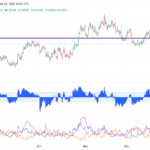What’s going on here?
The dollar steadied near a three-week low on Wednesday as Federal Reserve Chair Jerome Powell’s cautious comments kept market enthusiasm in check.
What does this mean?
Despite some gains, the dollar’s movement was hindered by remarks from Powell, who ruled out a rate cut until inflation nears the 2% target. He also highlighted a cooling job market and ‘two-sided risks,’ setting a cautious tone ahead of the upcoming Consumer Price Index (CPI) report for June. The dollar index, which measures the US currency against six major peers, remained steady at 105.09 after a minor rise on Tuesday, following a recent dip due to weak payrolls data. Traders now see a 73% chance of a rate cut by September, according to the CME FedWatch tool, down slightly from earlier expectations.
Why should I care?
For markets: Central bank caution keeps markets on their toes.
Powell’s measured approach continues to influence market sentiment, making investors wary of making bold moves. While the dollar index held firm, the mixed reactions among other currencies reflect broader uncertainty. The New Zealand dollar fell by 0.51% after the Reserve Bank of New Zealand hinted at potential rate cuts should inflation fall, shifting from their earlier stance. Meanwhile, the Australian dollar showed resilience against its neighbor, highlighting the diverse impacts of central bank policies worldwide.
The bigger picture: Global economic shifts and central bank strategies.
Currencies around the globe are reacting to varying degrees of economic certainty and central bank actions. The euro remained steady amid political tensions in France, while the yen gained slightly as markets anticipate the Bank of Japan’s upcoming meeting. With markets pricing in a 60% chance of a BoJ rate hike this month, we could see more shifts in global currency dynamics. Analysts suggest that central banks’ cautious but strategic moves are shaping the responses of economies worldwide, keeping inflation and economic growth in tight focus.




















